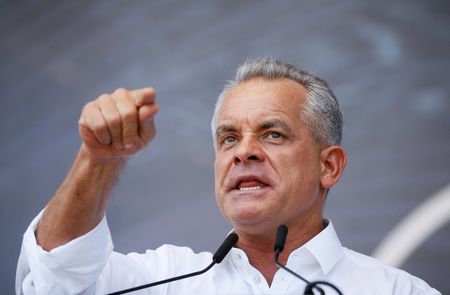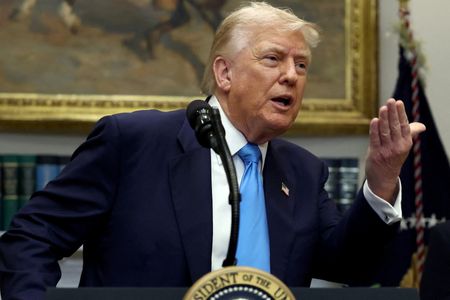By Bianca Flowers and Disha Raychaudhuri
(Reuters) -U.S. President Donald Trump’s first 100 days in office have featured an unapologetic assault on diversity and inclusion efforts, unraveling decades-old policies to remedy historical injustices for marginalized groups in a matter of weeks.
In his second term, Trump revoked a landmark 1965 executive order mandating equal employment opportunities for all, slashed environmental actions to protect communities of color and ordered the gutting of an agency that helped fund minority and women-owned businesses.
Claiming diversity, equity and inclusion initiatives that became popular over the last two decades are themselves discriminatory and stifle merit, the Trump administration has also canceled government contracts it says were tied to “illegal DEI,” shuttered offices addressing civil rights violations and frozen research grants on racial disparities in healthcare.
The actions have alarmed advocates, who say they effectively erase decades of hard-fought progress on leveling the playing field for marginalized communities.
Hector Sanchez Barba, president and CEO of Mi Familia Vota, a nonpartisan organization that mobilizes Latino voters, criticized the directives as a “white supremacist’s agenda.”
“He’s attacking the pillars that maintain and sustain our democracy – it’s going back to a horrible history of exclusion of minorities from many spaces in our society,” Sanchez Barba said.
The White House did not respond to a request for comment. Trump has previously denied claims he has employed racist attacks and an agenda throughout his political career. Senior administration officials have defended gutting DEI initiatives, arguing they are discriminatory by nature.
“The pushback against DEI policies was the result of a perception, which I think was grounded in reality, that the hyperfocus on race and the use of a racial lens to view almost everything was itself a distortion,” said William Jacobson, a law professor at Cornell University.
An executive order Trump signed on his first day in office eliminated all chief diversity officers in the federal government, stopped programs to remove discriminatory barriers and terminated contracts related to racial sensitivity training — initiatives it described as “immoral.”
The pushback on DEI is part of a broader effort by Trump to create a more authoritarian structure in the U.S., argues Lawrence Rosenthal, chair of the Center for Right-Wing Studies at the University of California, Berkeley: “It displaces both institutions and established processes of the American government.”
CURRICULUM CENSORSHIP
Education has been a major target of the administration’s efforts to do away with DEI programs.
The administration has threatened to revoke federal funding from schools and universities that engage in DEI practices, though judges last week blocked that effort. The Department of Education also warned in a March letter that they could face financial penalties or lawsuits.
The Department of Education’s workforce itself has been slashed in half and seven of its 12 Office for Civil Rights offices, which investigate complaints ranging from racial harassment to accessibility for students with disabilities, have been shuttered.
“We are thinking about the complainants who aren’t going to get justice, or if they are even fortunate enough to get justice it may not be for years,” said Terri Gonzales, chief attorney in the Dallas OCR office.
She was abruptly placed on administrative leave on Jan. 31 after 14 years there, with her position’s connection to DEI cited as the reason for her dismissal.
“I felt like the rug had been completely pulled out from underneath me,” said Gonzales.
‘REFRAMING THE PAST’
In one executive order targeting museums and cultural institutions, Trump accused them of fostering “national shame” and singled out the Smithsonian Institution — which includes 21 museums and the National Zoo — of promoting “improper ideology.”
The National Museum of African American History and Culture was also criticized for portraying American and Western culture as “inherently harmful.”
The administration did not specify what that meant, though critics have suggested the language is a reference to Trump’s longtime complaints of a focus on systemic racism in U.S. institutions that promotes anti-white bias.
The administration has also removed, sometimes briefly, historical content about African Americans and other minorities from government websites. In one instance, after facing public backlash, the National Park Service restored a quote and an image of U.S. abolitionist Harriet Tubman that had been removed from a website about the Underground Railroad network, which helped enslaved Africans escape, according to media reports.
Historians say U.S. institutions and museums offer an unbiased look at American history and fear the actions are part of a broader effort to suppress honest discussions about U.S. history, particularly issues of race, inequality, and systemic injustice, while promoting a sanitized view of American history.
“How on earth can you teach about Rosa Parks without talking about racism? It’s an effort to reframe the past and that matters because it reframes how we understand the present,” said Mark Bray, assistant teaching professor at Rutgers University, referring to the civil rights activist.
The Stonewall National Museum, Archives & Library in Fort Lauderdale — one of the largest LGBTQ+ libraries in the country — was notified in February that it would no longer receive federal funding, cutting its budget by 25% to 40%.
“I’m most concerned about death by a thousand cuts in trying to preserve our collections,” said Robert Kesten, the museum’s executive director, pointing to the loss of corporate donors.
ECONOMIC REGRESSION
The pushback against DEI has extended to corporate corridors. Many corporations have dropped diversity efforts or modified language in response to Trump’s directive to potentially investigate firms that practice it.
The Minority Business Development Agency — a government agency within the Commerce Department — which for 56 years helped women- and minority-owned businesses access funding has laid off staff and lost $68 million in funding, according to a tracker built by Democratic staff of the House and Senate Appropriations Committee.
“There are three things happening that are interrelated: it’s the attempt to erase history, deny history and remove any evidence of history,” said Alphonso David, president and CEO of Global Black Economic Forum, which focuses on boosting economic opportunities for Black and marginalized communities.
(Reporting by Bianca Flowers and Disha Raychaudhuri; Editing by Kat Stafford and Deepa Babington)















